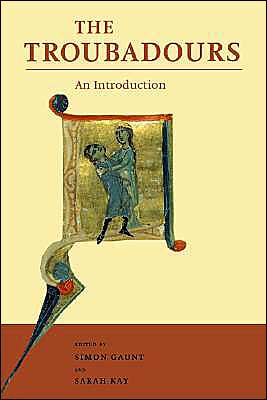

 |

|

The average rating for The Troubadours: An Introduction based on 2 reviews is 2.5 stars.
Review # 1 was written on 2016-08-26 00:00:00 Sean Ross Sean Ross"This book is both a collection of self-contained essays and a textbook." thus the editors declare in their opening preface. as a textbook, it fails spectacularly. after a brief chapter on sociohistorical context, two essays examine the development of the canso and satiric genres, respectively. the next three chapters allegedly deal with the successive generations of troubadours, but Stephen Nichols, in his chapter on the early poet/singers, instead discusses the editorial treatment of their lyrics in the chansonniers, which were compiled about a century after that first generation lived. which would be great! - except that two other essays deal with the transmission of troubadour song, and Nichols forgets to summarize or even state who the first troubadours were, leaving the novice student to hunt for chronological clues dropped in other essays. similarly, Gérard Gouiran's chapter spends as much time ruminating on the misuse of the term "classic" to characterize troubadour poetry as it does actually describing the poets and poems to whom said term is usually applied. the token essay on music in this otherwise literary anthology is by Margaret Switten, whose work i'd never encountered before. after reading her offering i understand why. her essay deals with versification, and not only does she use gendered terminology roundly condemned in musicology since the late 80s ("feminine" and "masculine" cadences? uh, no), her emphasis on the distinction is nonsensical because "feminine" 'non'- or 'half'-syllables are still articulated as separate notes in the melodies, making them aurally indistinguishable from "masculine" end-rhymes in performance. in other words, no matter how important Switten insists the two-fold distinction to be, her opinion clearly wasn't shared by the troubadours. further, since her essay uses music-theoretical terminology with no definitions or explanations offered, it would be impenetrable to a student without music theory training. since this introduction is targeted at entry-level lit students, i wonder why it's included at all. the essays on contemporary reception range from blandly acceptable to more hot garbage - never have i more appreciated musicology's academic parochialism than when wading through Sarah Kay's Lacanian reading of Arnaut Daniel. (then again, no edition of JAMS is complete without at least one fervent Schenkerian proclaiming some essentialising bullshit about atonality, so i suppose each discipline must exorcise its own demons.) much better, and honestly this book's real MVPs, are the three chapters dealing with medieval reception of the troubadours. Tilde Sankovitch's essay on the trobairitz and Miriam Cabré's examination of the Occitan lyric's diffusion in Italy and Aragon are also informative and insightful. proceed with caution. |
Review # 2 was written on 2015-04-06 00:00:00 William Randell William RandellIf there is one thing I would disagree with Mr.Uebel on, it is his saying that Christianity wants global enviromental damage to occur in order to bring about the End Times. Anyone can look up what God says about people who willfully destroy the earth. Mr. Ubel seems to have (willfully) left that bit out. |
CAN'T FIND WHAT YOU'RE LOOKING FOR? CLICK HERE!!!